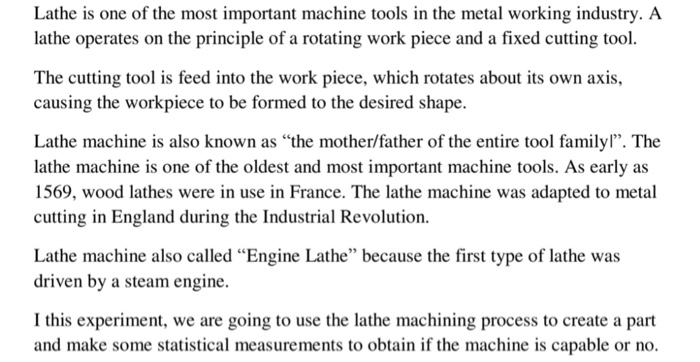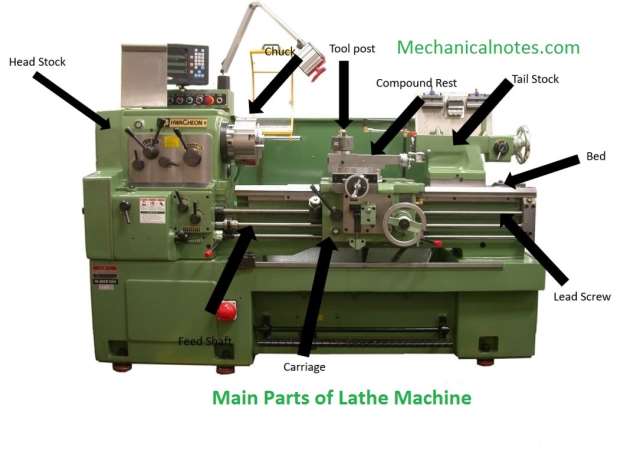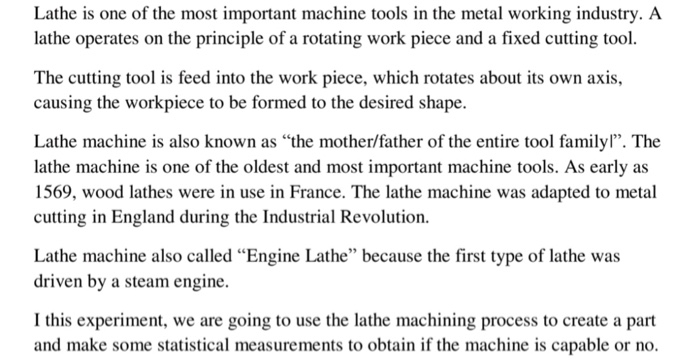Why is a lathe important? Let me take you through a fascinating journey into the world of machining and the key role of a lathe. Imagine shaping metal into intricate forms, crafting precision parts for cars and airplanes, and turning blocks of raw material into beautiful pieces of art. Whether you’re a curious mind or a future engineer, understanding the importance of a lathe will open your eyes to the wonders of manufacturing and craftsmanship.
So, what exactly is a lathe? It’s a versatile machine that spins a workpiece while a cutting tool shapes it. Think of it as the ultimate woodworking partner or metalworking wizard. From cylinders to cones, threads to grooves, a lathe can create a wide range of shapes and sizes with incredible precision. It’s like having a master sculptor who can shape objects in minutes with impeccable accuracy.
Why should we care about lathes? Well, imagine a world without lathes. No smooth cylinders for engines, no perfectly shaped pipes for plumbing, and no intricately carved furniture. Lathes are integral to industries like automotive, aerospace, and construction. They play a key role in shaping the very things we use every day, from the cars we drive to the buildings we live in. Without lathes, the world as we know it would be very different indeed. So, let’s dive into the fascinating world of lathes and discover why they’re truly important!

Why Lathe Is Important: A Comprehensive Guide to Understanding its Significance
Lathe machines have been a cornerstone of manufacturing and machining for centuries. From shaping wood to metalwork, lathes play a crucial role in creating intricate and precise designs. In this article, we will delve into the reasons why lathe machines are important and explore their various applications in different industries. Whether you’re a professional machinist or a hobbyist, understanding the significance of a lathe can enhance your knowledge and skills in the field.
The Historical Significance of Lathes
The origins of the lathe can be traced back to ancient civilizations such as Egypt and Mesopotamia. Initially, lathes were used primarily for woodworking purposes. Craftsmen would manually rotate a workpiece against a cutting tool to shape and carve intricate designs. Over time, lathes evolved to incorporate mechanical power, allowing for more precise and efficient machining. Today, computer numerical control (CNC) lathes have revolutionized the industry, providing automation and advanced capabilities. Understanding the historical significance of lathes helps us appreciate their evolution and the impact they have had on various industries.
Lathes are invaluable in the manufacturing sector, enabling the production of complex and precise components. From automobile parts to aerospace components, the ability to turn raw materials into finished products is critical. Modern lathes offer a wide range of capabilities, including threading, taper turning, and facing. With the advancement of CNC technology, these machines can execute complex movements with high accuracy and repeatability. By leveraging computer programming, lathe operators can create intricate designs that are difficult, if not impossible, to achieve manually. As a result, industries such as automotive, aerospace, and medical device manufacturing heavily rely on lathes to meet their production needs.
The Versatility of Lathe Machines
One of the most significant advantages of lathes is their versatility. Whether you’re working with wood, metal, or even glass, a lathe can provide the necessary precision and control. Woodturning, for example, is a popular application of lathes in the woodworking industry. Craftsmen can create exquisite furniture pieces, decorative items, and sculptures by shaping and carving wood on a lathe. Similarly, metal lathes allow for the machining of various metals, including aluminum, steel, and brass. This versatility makes lathes indispensable in multiple industries, catering to the diverse needs of different materials and applications.
Beyond traditional lathe applications, modern advancements in technology have led to the development of specialized lathes. For example, Swiss-style lathes are designed to handle small, intricate parts with high precision. These lathes excel in industries like watchmaking, where tiny components need to be manufactured with utmost accuracy. Additionally, multi-axis lathes provide enhanced flexibility by allowing simultaneous machining on multiple axes. This capability is particularly valuable in industries such as aerospace, where complex geometries and tight tolerances are required. The versatility of lathe machines has expanded their applications and made them indispensable tools in numerous industries worldwide.
The Benefits of Lathe Machines
Apart from their versatility, lathe machines offer a multitude of benefits in the manufacturing and machining sectors. First and foremost, lathes enable precise and accurate machining, ensuring the desired specifications of the workpiece. This level of precision helps reduce the need for further processing and eliminates costly errors. Moreover, lathe machines enhance productivity by allowing for faster material removal rates and reducing manual labor. Automated processes in CNC lathes enable continuous machining without the need for manual intervention, resulting in increased efficiency and reduced production time.
Another advantage of lathe machines is their cost-effectiveness. With the availability of affordable and compact lathes, enthusiasts and small-scale businesses can access the benefits of machining without significant investments. Additionally, lathes provide the opportunity for customization and prototyping. By utilizing the versatile capabilities of lathes, manufacturers and designers can create unique and innovative products that cater to specific requirements. The ability to rapidly iterate and refine designs through lathe machining is invaluable in industries where customization and innovation are crucial for success.
In conclusion, lathe machines hold immense importance in the manufacturing and machining industries. Their historical significance, versatility, and the array of benefits they offer make them indispensable tools across various sectors. From woodwork to metalwork, the precision and control provided by lathes enable the creation of intricate designs and high-quality products. As technology continues to advance, we can expect further innovations in lathe machines, expanding their capabilities and applications even more.
Key Takeaways: Why Lathe is Important?
- A lathe is a machine used for shaping wood, metal, or other materials.
- It helps in creating symmetrical and precise objects.
- Lathe can be used for various tasks like turning, facing, drilling, and more.
- It is an essential tool in woodworking, metalworking, and manufacturing industries.
- By using a lathe, one can craft intricate designs and parts with accuracy.
Frequently Asked Questions
Welcome to our FAQ section where we answer the most common questions about the importance of the lathe. If you’re curious about why the lathe is an essential tool, you’ve come to the right place. Read on to find answers to all your burning questions!
What is a lathe?
A lathe is a powerful machine used in woodworking, metalworking, and other industries. It rotates a workpiece on its axis, allowing for precision cutting, shaping, and drilling. Lathes are available in various sizes and configurations, from small benchtop models to large industrial machines.
These versatile tools can perform a range of tasks, including turning, facing, threading, and tapering, making them indispensable in countless manufacturing processes.
Why is a lathe an important tool?
The lathe is crucial because it simplifies and accelerates many manufacturing processes. It allows artisans and workers to shape materials with precision, creating intricate designs and achieving high-quality finishes. Without a lathe, achieving the same level of accuracy and control would be challenging, time-consuming, and often unattainable.
Moreover, lathes are used to create symmetrical objects, such as bowls, furniture legs, and musical instruments. They can also be employed for repairs and modifications, making them a vital tool in both production and maintenance work.
What are the key benefits of using a lathe?
The benefits of using a lathe are numerous. Firstly, lathes allow for dimensional accuracy, ensuring consistent and precise measurements in every piece produced. This is crucial for industries where uniformity and standardization are required. Secondly, lathes make complex shapes and patterns achievable, enabling the creation of intricate designs and decorative elements.
Additionally, lathes are versatile machines that can work with a wide range of materials, including wood, metal, and even plastics. This flexibility expands the possibilities for creative work and opens up avenues for experimentation and innovation. Lastly, lathes improve efficiency and productivity, enabling faster production times and reducing material wastage.
Can a lathe be used by beginners?
Yes, lathes can be used by beginners. While mastering the art of lathe work may take time and practice, modern lathes come with user-friendly features and safety mechanisms that make them accessible to beginners. Many manufacturers also provide resources and tutorials to help novices get started with basic lathe techniques.
Starting with simple projects and gradually progressing to more complex ones is an excellent way for beginners to build their lathe skills. With patience and dedication, anyone can learn to use a lathe effectively and unlock its creative potential.
Is safety a concern when using a lathe?
Yes, safety is of utmost importance when using a lathe. Lathes involve spinning parts, sharp cutting tools, and a variety of moving components, which can pose risks if proper precautions aren’t taken. It is essential to wear appropriate safety gear, such as eye protection, gloves, and ear protection, to reduce the risk of accidents.
Furthermore, it’s crucial to follow the manufacturer’s instructions and guidelines for safe operation. This includes securing the workpiece properly, using the correct tools and techniques, and monitoring the lathe throughout the operation. By prioritizing safety and adhering to best practices, lathe operators can protect themselves and others around them while maximizing the benefits of this essential tool.

Summary
So, why is a lathe important? A lathe is a machine that helps shape and create different objects. It allows you to turn and shape materials like wood, metal, and plastic, making them into useful and beautiful things. Whether you want to make a new table leg or a custom-designed bowl, a lathe can help you bring your ideas to life. It’s a tool that lets you be creative and build things with your own hands. With a lathe, you can explore your creativity and make things that you can be proud of. So, next time you see a lathe, remember how important it is for craftsmanship and making things!
